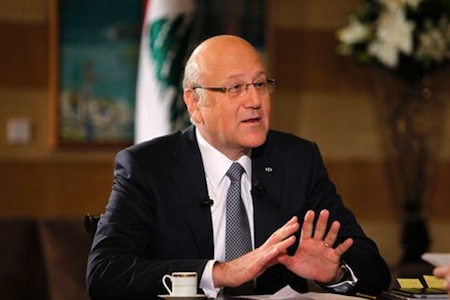In Lebanon, elections are both much less and much more than what we typically think of as elections. ![]()
Given that the country’s constitution mandates that the prime minister is always a Sunni Muslim, the president a Maronite Christian and the speaker of the national assembly a Shi’a Muslim, it’s not a surprise that parliamentary elections are a carefully stage-managed process of allocating seats to Lebanon’s national assembly (مجلس النواب) to ensure half of the seats (64) go to Muslims and another half (64) go to Christians — specific allocations guarantee a set number of seats for each of Lebanon’s 22 confessionals.
So the resignation of Lebanon’s prime minister Najib Mikati (pictured above) on Friday should be seen as a prologue to the electoral choreography, given that new elections are due in June when the current parliamentary terms ends. Lebanon’s president Michel Suleiman has accepted Mikati’s resignation, but asked Mikati to stay on as a caretaker prime minister until a new prime minister can be announced.
It should not necessarily be seen as a warning sign that Lebanon is invariably descending into chaos or that it is doomed to be drawn into Syria’s civil war, notwithstanding the latest clashes in Tripoli, which seem to have quieted since the weekend.
Tripoli, Lebanon’s second-largest city on its northern coast near the Syrian border, is especially geared toward tension, with its own Sunni majority and Alawite minority mirroring the demographic dynamic in Syria. But despite some high-profile kidnappings in the Bekaa Valley last August, and flare-ups from time to time in Tripoli, Lebanon has done a reasonable job in avoiding the same fate as Syria.
That’s in no small part due to the resolve of many (though not all) of Lebanon’s political elite to keep Lebanon from returning to the era of civil war that devastated the country in the late 1970s and 1980s, though as the Syrian civil war approaches its two-year anniversary, it’s becoming increasingly difficult for Lebanese leaders to remain neutral in the conflict. That became especially true after a car bomb blast in Beirut last October killed Lebanon’s top intelligence official, Wissam al-Hassan, a longtime Hariri ally — his assassination is widely believed to have been engineered by Syrian — or even Hezbollah (حزب الله) — forces. Hezbollah is also widely believed of actively supporting Bashar al-Assad’s regime with military force inside Syria, because Assad (together with Iran’s regime) are the two major lines of political and monetary support for Hezbollah. If Assad falls in Syria, Hezbollah will no longer be able to look to Damascus for patronage.
So while Mikati’s resignation need not mean an irreparable retreat for Lebanon, it nonetheless portends a difficult few months ahead — the key stumbling block is agreeing to an election law in advance of elections or, at minimum, the agreement for an electoral supervision body to oversee the planned June 9 poll. Another solution might include the extension of a national unity government with a minor delay of the elections.
The next step lies with Suleiman, who could call a ‘national dialogue’ among all of Lebanon’s political leaders in hopes of achieving at least a caretaker government to see through the implementation of a law that will clear the path for new elections. Continue reading Mikati’s resignation need not set off immediate alarms about Lebanon’s future
